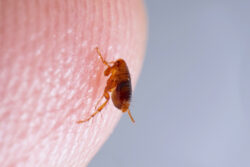While we love most things about summer, one factor we can all agree we don’t enjoy is the summer pest activity! With warmer weather, humid temperatures, and more outdoor human activity, pests are thriving during these summer months. While some summer pests are more noticeable, such as yellowjackets or mosquitoes, other pests can be unseen. Fleas, chiggers, and fleas are small, annoying, and extremely hard to spot. Check out their difference and how you can prevent them from biting you!
Ticks
Ticks have a flat oval-shaped body at a length of 1/8 of an inch. These pests have two body segments, making them an arachnid and not an insect. In Florida, these pests prefer areas with dense vegetation and high grasses, such as along fence lines, in wooded paths, or bushes. Ticks do need a blood meal to survive and will feed on humans, dogs, raccoons, birds, and more.
If a tick latches onto you, it can cause severe irritation and an allergic reaction, and their mouth parts can remain in the skin. They are also known to spread diseases such as Lyme disease, anaplasmosis, and babesiosis.
Chiggers
Often referred to as mites or red bugs, chiggers are red, orange, yellow, or straw-colored. These pests are part of the arachnid family and are extremely small, ranging to no more than .3 millimeters long. These pests prefer to live in grassy, moist environments such as wooded or grassy areas. While these creatures don’t pose a serious health threat to humans, they can create a rash if they’ve bitten you. Once they’ve attached themselves to a human, they don’t typically live very long.
Fleas
Fleas can be found in almost any environment but prefer to live in areas that have warm, humid temperatures. These pests are small and wingless with a reddish-brown body, only ranging 1/8 of an inch long. Fleas are most active when they’re hungry, latching onto dogs, cats, rats, opossums, and even humans. If they’ve latched onto you, their bites can be very irritating, causing excessive scratching breaking the skin and leading to infections.
These sneaky pests can be hard to catch, but it is possible to prevent them from your property. If you notice an increase in these pests at your home, consider calling your local pest control company, which will provide you with the best plan of action for prevention.


